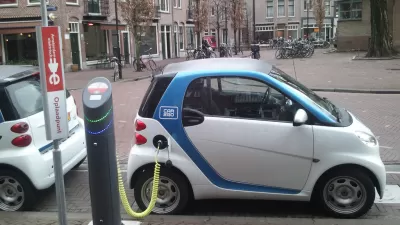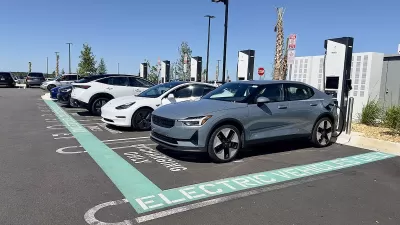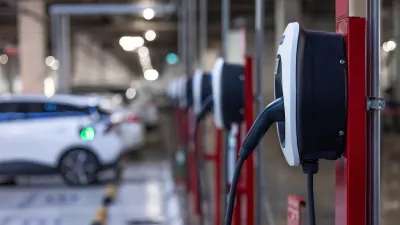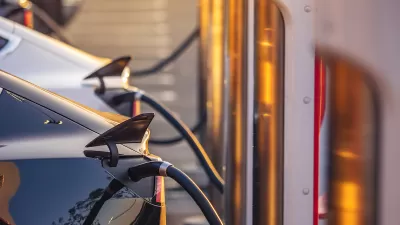Environmental sustainability on a national level is proving to be financially unsustainable on a local level for an island community in Norway that is counting on $20 tolls, with an electrical vehicle exemption, to pay off a $70 million tunnel.

Remember those warnings from transportation analysts that electric vehicles (EVs), which don't pay any gas taxes, would exacerbate the transportation funding crisis? Well, with less than 1 percent market share, EVs can't be blamed for the current Highway Trust Fund shortfall in the United States, but they can be blamed for a financial drain on a toll-financed, 3.5 mile undersea road tunnel that opened in 2009 for the 3,000 residents of the Norwegian island community of Finnøy.
Thanks to Norway's climate policies that exempt electric vehicles from paying tolls, the emission-free vehicles "now account for about a quarter of tunnel traffic, and allow owners to dodge one of the heaviest toll burdens in the country," writes Kjetil Malkenes Hovland for The Wall Street Journal.
“That doesn’t work in the long term,” says [Mayor] Gro Skartveit, who doubles as chairwoman of the company operating the tunnel. “We won’t be able to pay down the tunnel.”
Finnøy is not alone. There are 33 locally financed undersea road tunnels. The central government is aware of the problem. It "said in May it would gradually reduce incentives from 2018," writes Hovland.
Largely as a result of those perks, "one in five new cars sold in [June in] Norway was electric, up from one in eight a year earlier," writes Hovland. According to our January 2014 post, at the end of 2013, Tesla was the best-selling car, and the Nissan Leaf number three.
The government estimates it will lose over half a billion dollars in tax revenue on electric cars this year, while free parking and toll exemptions will cost tunnel, ferry and road operators another $40 million.
Tesla believes they can by bringing down the cost of EVs.
“If we didn’t have cheaper cars on the market by the time [Norwegian] incentives are reduced, we would be hit,” said Tesla’s Scandinavia spokesman Esben Pedersen. “But prices of electric vehicles are only going down, and Tesla will have a cheaper car on the market by 2017.”
What about the United States?
"Weaning buyers from such purchase incentives could add new headwinds to sales of vehicles already undercut by cheap fuel prices in some markets," writes Hovland. "In the U.S., the state of Georgia halted its $5,000 tax credit on July 1."
Electric cars were about 2% of purchases in the state in 2014, estimates Washington-based think tank Keybridge Research LLC. It forecasts a 90% decline, or 8,700 fewer sales annually, as a result of the loss.
Asked to comment on the anticipated hit to the EV industry in the Peach State, a Union of Concerned Scientists spokesman pointed to the remaining perks the EVs will enjoy: "Workplace charging stations, access to high-speed highway lanes and price breaks offered by utilities, could help mitigate the loss of tax incentives in the state, he said."
All of which begs the question: How essential are perks to the EV industry, and what happens if they are removed?
FULL STORY: Electric-Car Perks Put Norway in a Pinch

Planetizen Federal Action Tracker
A weekly monitor of how Trump’s orders and actions are impacting planners and planning in America.

San Francisco's School District Spent $105M To Build Affordable Housing for Teachers — And That's Just the Beginning
SFUSD joins a growing list of school districts using their land holdings to address housing affordability challenges faced by their own employees.

The Tiny, Adorable $7,000 Car Turning Japan Onto EVs
The single seat Mibot charges from a regular plug as quickly as an iPad, and is about half the price of an average EV.

Seattle's Plan for Adopting Driverless Cars
Equity, safety, accessibility and affordability are front of mind as the city prepares for robotaxis and other autonomous vehicles.

As Trump Phases Out FEMA, Is It Time to Flee the Floodplains?
With less federal funding available for disaster relief efforts, the need to relocate at-risk communities is more urgent than ever.

With Protected Lanes, 460% More People Commute by Bike
For those needing more ammo, more data proving what we already knew is here.
Urban Design for Planners 1: Software Tools
This six-course series explores essential urban design concepts using open source software and equips planners with the tools they need to participate fully in the urban design process.
Planning for Universal Design
Learn the tools for implementing Universal Design in planning regulations.
Smith Gee Studio
City of Charlotte
City of Camden Redevelopment Agency
City of Astoria
Transportation Research & Education Center (TREC) at Portland State University
US High Speed Rail Association
City of Camden Redevelopment Agency
Municipality of Princeton (NJ)





























